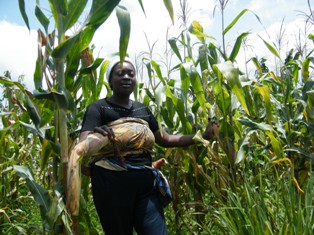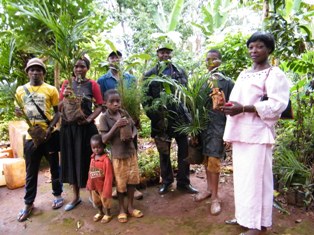
By Aaron Kaah Yancho
The difference between despair and hope in agriculture can be as slim as a small animal or tree in the grass field of Cameroon.
It is not these small animals like goats and pigs, dairy cattle that have given some farm families, hope but their abilities to put their knowledge, into use within their community. Thanks to the knowledge received during the training supported by Heifer International Cameroon, these farm families now know how to adjust to the changing agricultural times.
It all started when members of this group benefited from Heifer Cameroon training in integrated livestock management, composting, care for land, tree planting and sanitation alongside a donation of 2 animals each in 2014, members of this group looked beyond these animals to translate their dreams into reality and to be at the frontline of farmers combating the effects of climate changes in the grass field of Cameroon.
The novel farming technology with compost manure was particularly good news as most farmers, if not all in this communities and groups depended upon chemical fertilizer to grow crops as a result of the barren soils and the burning of compost in the fields to cultivate food crops added to their woes -the changes in this seasonal uncertainties made food crop production a tedious task.
For many farmers who live in this community life was hard, simply not only because of these obsolete farming skills they practiced but the change in rainfall and unpredictable seasons.
Like almost every member of the community wanting to survive this low food crops yields and harsh farming climate, some 22 farm families turned around to try something new like combating the effects against climate change. They consulted and the idea to form the Maraicher self help group was born.
“It was good for us to put our heads together but we didn’t know exactly what to do next” Djeutieu Jean Felix the president of the group recalled. As the years went by, no noticeable changes were observed in this group.
Despite their best efforts these farmers ignorantly burnt valuable grass deposits in their farm fields at the detriment of the soil and environment. This lead to barren soils and constant erosion and these poor farmers turned to chemical fertilizer which they could not afford.
A cycle of poverty ensued within the group and community.
“The evidence was hardship and poverty”. Djeutieu Jean Felix said. Next the group members diverted to livestock rearing as a means of survival but the rearing of animals in open free ranges and ground floors attracted air and land pollution, environmental degradation and farmer grazer conflicts.
the rearing of animals in open free ranges and ground floors attracted air and land pollution, environmental degradation and farmer grazer conflicts.
Limited knowledge of what good species to keep and the total absence of ethno-vetinary skills destroyed the efforts of these farmers. The ability of the group to overcome poverty and the consequences of climate change became a very complex issue according to Jean Felix.
In 2013, when Heifer Cameroon came to the assistance of the group with animals and new skills, the members paid immediate and particular action to fixing these farming challenges.
These farmers saw in these donated animals a ready source of dung which according to all of them is a rich food crop fertilizer.
“Our priorities were to set our farming records straight” Jean Felix remarked. From the onset these farmers constructed barns with raised floors contrary to the past. “The pay back was immediate”. Madou Rose one of the group members said.
The raised floors provided a possible means for members of this group to collect manure and to start compost farm projects.
We began collecting animal waste and food crop residue to fill the barns in readiness for the farming season” Jean Felix said. Some members of the group began experimenting with compost by starting gardening projects. His solution to their farming worries like land degradation and erosion was sort.
“I could not believe how much we were missing” Mathew said. These families cultivated less hours and reaped triple fold from the same pieces of land where they had farmed with chemical fertilizer.
“Onlookers said we had entered a secret society but the secret was our hard work because we were cultivating seriously with animal manure and compost” Mathew said.
This new wave of farming soon became a model for members of this common initiative group. With food crops, members of the group satisfied their feeding desires and this gave them causes to jubilate over their successes.
“We took surplus to the market and immediately our living conditions changed” Madou Rose said. Annual household incomes within the group had risen from 250.000fcfa to 800.000 as a result of the high food crop yields .
The value attached to animal waste began changing for the best unlike before when it was considered a huge source of pollution in the community. “Members of this group collected this dung very tactfully on daily basis to store in bags in readiness for use”. Jean Felix remarked. This effort helped not only to keep the barns cleans but to keep the environs neat.
To consolidate the popularity of compost manure, the group members began contributing corn and food crops in exchange for animals waste with large scale poultry and pig farmers within their region. This manure was distributed to farmers following the proportion of their contributions.
“This cheap and affordable manure had enabled the group to start a tree nursing farm and the revenue earned from the proceeds helped to buy emergency needs like books, tables and chairs for the group” Jean Felix said.
Farming with trees had also greatly repaired the soil for these enthusiastic farmers unlike in the past when these trees were considered obstacle in their food crop cultivation. These tree leaves provide shade for these farmers, help like wind brakes in the fields as their leaves fertilized the soil, at the same free attracting bees, pollinators of food crops.
This also necessitated high food crop yields. Apart from the fact that these trees mitigated the climate change impact in this community, they provided fodder for animals and fruits for man. According to Kadji Jean Paul each farmer had planted an average of 50 trees in the last one year.
Another cheap affordable approach practiced by members of this group is the now rearing of their animals in raised floors. “The hygiene component of it is what we enjoy most” Mathew said.
These raised floors enable this group of farmers to be able to collect waste, and to keep piggeries and barns clean. The group is also encouraging members to share their various experiences with one another in a bid to foster their wishes in this project. “I have planted over 8 species of medicinal plants which provide a remedy for my 23 pigs” Jean Felix said.
The sharing of these experiences to other farmers through hands-on training and group organized training sessions have overwhelmingly pulled these communities out of poverty and ignorance. Today members of these groups have hopes that with the passage of time they will continuously be creative agents of change in their community in the apex of the climate changes.












